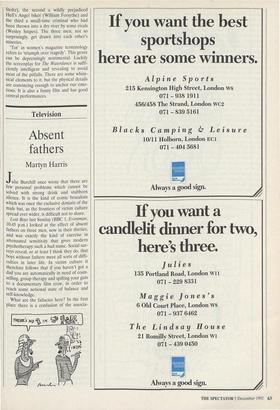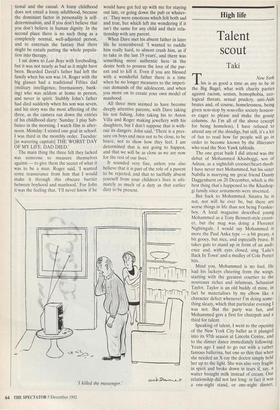Television
Absent fathers
Martyn Harris
Julie Burchill once wrote that there are few personal problems which cannot be solved with strong drink and stubborn silence. It is the kind of comic brutalism Which was once the exclusive domain of the male but, as the frontiers of victim culture Spread ever wider, is difficult not to share.
Lost Boys last Sunday (BBC 1, Everyman, 10.45 p.m.) looked at the effect of absent fathers on three men, now in their thirties, and was exactly the kind of exercise in attenuated sensitivity that gives modern Psychotherapy such a bad name. Social sur- veys reveal, or at least I think they do, that boys without fathers meet all sorts of diffi- culties in later life. In victim culture it therefore follows that if you haven't got a dad you are automatically in need of coun- selling, group therapy and spilling your guts to a documentary film crew, in order to reach some notional state of balance and self-knowledge.
What are the fallacies here? In the first Place there is a confusion of the associa- tional and the causal. A lousy childhood does not entail a lousy adulthood, because the dominant factor in personality is self- determination, and if you don't believe that you don't believe in human dignity. In the second place there is no such thing as a completely normal, well-adjusted person, and to entertain the fantasy that there might be entails putting the whole popula- tion into therapy.
I sat down to Lost Boys with foreboding, but it was not nearly as bad as it might have been. Bearded David's father had left the family when his son was 14. Roger with the big glasses had a traditional Fifties dad (military intelligence, freemasonry, bank- ing) who was seldom at home in person, and never in spirit. Stubbly John's father had died suddenly when his son was seven, and his story was the most affecting of the three, as the camera ran down the entries of his childhood diary: 'Sunday: I play Sub- buteo in the morning. I watch film in after- noon. Monday: I scored one goal in school. I was third in the monthly order. Tuesday: [in wavering capitals] THE WORST DAY OF MY LIFE. DAD DIED.'
The main thing the three felt they lacked was someone to measure themselves against — to give them the secret of what it was to be a man. Roger said, 'I wanted some reassurance from him that I would make it through this obscure barrier between boyhood and manhood.' For John it was the feeling that, 'I'll never know if he would have got fed up with me for staying out late, or going down the pub or whatev- er.' They were emotions which felt both sad and true, but which left me wondering if it isn't the same for any child and their rela- tionship with any parent.
When Dave met his absent father in later life he remembered: 'I wanted to cuddle him really hard, to almost crush him, as if to take in the last 19 years', and there was something more authentic here in the desire both to possess the love of the par- ent and to kill it. Even if you are blessed with a wonderful father there is a time when he no longer measures to the imperi- ous demands of the adolescent, and when you move on to create your own model of manhood.
All three men seemed to have become deeply attentive parents, with Dave taking his son fishing, John taking his to Aston Villa and Roger making jewellery with his daughters, but I don't suppose that is with- out its dangers. John said, 'There is a pres- sure on boys and men not to be close, to be brave, not to show how they feel. I am determined that is not going to happen, and that we will be as close as we are now for the rest of our lives.'
It sounded very fine, unless you also believe that it is part of the role of a parent to be rejected, and that to tactfully absent yourself from your children's lives is ulti- mately as much of a duty as that earlier duty to be present.
'I killed the messenger.'











































































 Previous page
Previous page